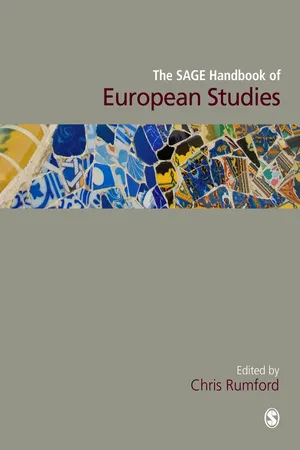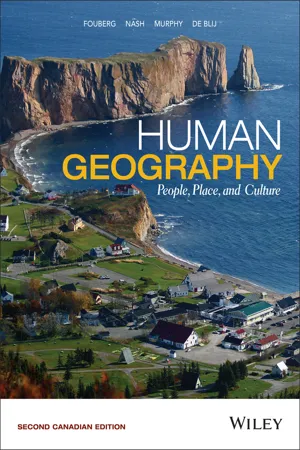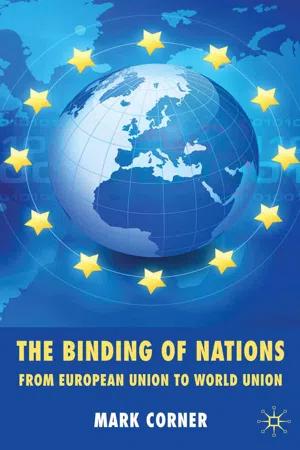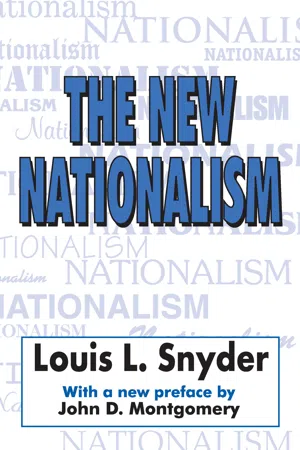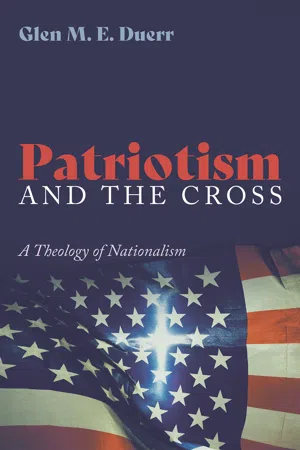Geography
Supranationalism
Supranationalism refers to the voluntary association of three or more states for mutual benefit. It involves the delegation of some authority or sovereignty to a supranational organization, such as the European Union or the United Nations. This concept is significant in understanding the dynamics of political and economic integration among countries.
Written by Perlego with AI-assistance
Related key terms
1 of 5
6 Key excerpts on "Supranationalism"
- eBook - PDF
- Alistair Jones(Author)
- 2016(Publication Date)
- EUP(Publisher)
106 Britain and the European Union What is Supranationalism? To detractors of the EU, the concept of ‘Supranationalism’ carries much emotional baggage. Supranationalism means loss of national sovereignty, greater integration and ultimately the for-mation of a United States of Europe. The EU, as a supranational organisation, is to be questioned, resisted and perhaps even ostra-cised. Nations must resist this idea, otherwise they will be subsumed within this monster. The problem is that such emotive language actually distorts the idea of Supranationalism. In the long term, there may eventually be an ultimate move to form a United States of Europe, but a suprana-tional approach does not necessarily guarantee that such a union will occur. So what is Supranationalism? This is where some states have ceded some decision-making powers to a higher authority – in this particular case, the EU. These decision-making powers are only in specified areas, however, such as agriculture and thus the Common Agricultural Policy. It is important to note that although these decision-making powers have been ceded to the EU, they can be returned to the individual states. So, although critics may see this ceding of decision-making powers as a ceding of sovereignty to the EU, the reality is that a state can withdraw from the organisation at any time. The individual states may, acting collectively, decide to return some decision-making powers back to the member states – something for which David Cameron has been lobbying. Part of the perceived problem with Supranationalism is that the authority to which powers are ceded is independent of the member states. Its decisions are binding on all member states – in fact, they override national law should the two conflict. Such a situation highlights the fact that Supranationalism is far greater than mere co-operation between countries. In specified areas, the higher authority is the supreme decision-making body. - eBook - PDF
- Chris Rumford(Author)
- 2009(Publication Date)
- SAGE Publications Ltd(Publisher)
Supranationality was about engaging in periodic compromises as part of a wider process by which common interests were upgraded. In these terms, Supranationalism is a kind of collective action regime (Gruber, 2000), but it is one which departs from classical patterns of international coopera-tion where states seek to protect their (exogenously derived) interests. Under supra-nationalism interests are transformed and (re-)emerge endogenously in the context of novel institutional arrangements. For some, this internal dynamic was elemental to the transition of European international rela-tions into a more federated system (Haas, 1958: 59). Of course, this depiction of the particular qualities of the EU polity is open to contest. Most obviously a clutch of rival studies – generally labelled ‘intergovernmentalist’ – take fundamental issue with elements of the account developed by Ernst Haas and his followers (Hansen, 1969; Hoffmann, 1966; Moravcsik, 1998), emphasizing instead the 6 90 THE SAGE HANDBOOK OF EUROPEAN STUDIES prevailing logic of national interests and the (relatively trivial) role of EU-level institu-tions as mere ‘agents’ of member-state ‘prin-cipals’ (Pollack, 2003). Such work has significant problems with the description of the EU as ‘supranational’, not least because the term is suggestive of root and branch change to (as opposed to modification of) the basic structures and logics of interna-tional politics. Discussions of the EU can often get locked into a standoff between rival supranationalist and intergovernmentalist accounts of the growth of integration and European-level policy competence. While this debate clearly captures something impor-tant, it certainly does not exhaust the range of possible questions to be asked about European supranational governance. - eBook - PDF
Human Geography
People, Place, and Culture
- Erin H. Fouberg, Alexander B. Nash, Alexander B. Murphy, Harm J. de Blij(Authors)
- 2015(Publication Date)
- Wiley(Publisher)
With continued economic instability, along with high unemployment rates for young people, some are questioning the future of the EU. HOW DOES Supranationalism AFFECT THE STATE? Supranationalism is a worldwide phenomenon. Other economic associations, such as the North American Free Trade Agreement (NAFTA), the Association of Caribbean States (ACS), the Central American Common Market, the Andean Group, the Southern Common Market (MERCOSUR), the Economic Community of West African States (ECOWAS), the Asia-Pacific Economic Cooperation (APEC), and the Commonwealth of Independent States (CIS), have drawn up treaties to reduce tariffs and import restrictions in order to ease the flow of commerce in their regions. Not all of these alliances are success- ful, but economic Supranationalism is a sign of the times, a grand experiment still in progress. Yet when we turn back to the European Union, we are look- ing at a supranational organization that is unlike any other. It is not a state, nor is it simply an organization of states. The European Union is remarkable in that it has taken on a life of its own—with a multi-faceted government structure, three capital cities, and bil- lions of euros flowing through its coffers. The EU is extending its reach into foreign relations, domestic policies, and military poli- cies, with sovereignty over certain issues moving from the states to the organization. In fact, citizens in the Benelux countries (the first members) and in regions where people have been disempow- ered by their state governments often identify more strongly with the European Union than with their state. With the EU, we may be witnessing a transformation in the political organization of space similar to the development of the modern state system in Europe in the 17th century. - eBook - PDF
The Binding of Nations
From European Union to World Union
- M. Corner(Author)
- 2010(Publication Date)
- Palgrave Macmillan(Publisher)
In the end it appears to have taken root in some places even as it has been stamped out in others. But still, in however attenuated a form, it lives. Such an idea was Jean Monnet’s proposal of ‘Supranationalism’. The main reason why it took centre stage in 1950 was not because people accepted that a new way of ordering relations between states was necessary. Rather, it stole into prominence as a way out of an awkward situation in Franco-German relations. It had its advocates and its critics in even measure – and whether it prevailed was often a matter of polit- ical alliances and convenience. The French foreign minister Robert Schuman could trail its merits in a grandiose way when making speeches. He could talk about putting an end to war and guaranteeing eternal peace. He could say that this was the ‘supreme attempt to save our continent and preserve the world from suicide’, words he used in St. James’s Palace in London in May 1949. But he knew perfectly well that he could begin to succeed only by showing that ‘supranational- ism’ was the answer to the immediate problems of France. What is this idea of ‘Supranationalism’? It is essentially a sharing of sovereignty between nations, as opposed to a treaty or agreement between nations. It is limited to particular areas – initially, in the case of Europe, it was limited to coal and steel. In practical terms, it means that the nations agree to vest authority in a ‘High Authority’ of some kind – a body that is above the level of the nation-state (hence the appropriateness of the term ‘Supranationalism’). This authority then takes the decisions in those areas where the pooling of sovereignty has been agreed upon. Unlike a treaty, an agreement which does not carry the force of law, the sharing of sovereignty is legally binding and legally enforceable. The decisions of the High Authority are binding – legally binding – upon the nations concerned. - eBook - ePub
- Louis Snyder, Louis L. Snyder(Authors)
- 2017(Publication Date)
- Routledge(Publisher)
To supporters of the One World idea, Supranationalism is the only way to end the centuries-old blight of war. They recommend that the methods by which citizens of any one country have lived in peace among themselves should be applied to international relations. Nationalism should be extended to its next logical step—a United States of the World. Just as the people of one nation accept the fact that their problems can be solved only by common laws, traditions, and institutions, so should the peoples of the world act together for their common good.How can this supranational society be attained? First, say its advocates, by promoting a voluntary pool of nationalities in regional form. Then world regional organization would be established in which each part owed its ultimate loyalty to the world society. Where the Italian liberal nationalist Giuseppe Mazzini had projected the idea of a sisterhood of nations within the framework of the old nationalism, those supporting the One World idea favor a combination of regions within a world context. The many evils of nationalism would be dissolved by Supranationalism. As political friction is removed, as industrial, technological, and scientific revolutions bring greater prosperity to peoples everywhere, as the social order becomes more urban and cosmopolitan, as cultural barriers are broken down, and as people become psychologically prepared for a new form of global organization, a workable and peaceful world order becomes possible. Just as western Europe's medieval society turned into an organization of states in the early modern period, so would the present system of national states be succeeded by a new type of world organization. If representatives of more than a dozen nations could work together in harmony in Antarctica, why could there not be a working Supranationalism elsewhere?Advocates of a world federation say that it would eliminate international anarchy and provide a rational basis for international relations. They would adapt the ideas of the American Founding Fathers to current world problems. A distinction is made between two kinds of sovereignty: a legitimate form that takes jurisdiction over a nation's institutions and culture; and an illegitimate form—by which one people may endanger another—that takes the way of unilateral action in the world community. World federalism, say its proponents, would distinguish between these two forms. It would enact clear laws defining the nation's sovereignty, the limits of its freedom of movement, and its place in global society. It would prevent nations from arbitrarily pursuing their own interests. The old disputes and conflicts would disappear as men outgrew their political adolescence. - eBook - ePub
Patriotism and the Cross
A Theology of Nationalism
- Glenn M. E. Duerr(Author)
- 2020(Publication Date)
- Resource Publications(Publisher)
306 Although NATO is criticized for conducting costly exercises, and for only achieving limited successes, the organization generally completes baseline objectives for its respective missions. This provides greater security for the citizens of NATO member states.The continued existence of NATO, therefore, maintains unity within North American and European democratic states, most of which have a historically Christian connection. Predominantly Muslim states like Turkey and Albania have been reliable partners, for the most part, until more recently when Turkish President, Recep Erdoğan significantly took steps towards authoritarian rule.ConclusionPut simply, Supranationalism is particularly difficult to assess biblically—there are no specific sections of the Bible that explain what to do with regards to the EU in the twenty-first century. To some extent, that is the point: that Christians should wrestle with Scripture and to ascertain how to apply the Word of God.There is no mandate for a supranational bloc, but Christians should be reverent to forms of government. The entirety of the New Testament is set under the harsh authoritarian governance of the Roman Empire. Jesus himself admonished His followers to provide due reverence for Caesar. The apostle Paul, in Romans 13 , describes the necessary respect owed to one’s rulers who have been placed in that position by God, whether liked by the people or not. Supranationalism provides a different model of regional identity, which provides a counter to the Genesis 11 idea of organizing humanity towards global government, globalism. Regionalism is advocated under Supranationalism, not globalism; although the creation of supranational entities moves national identification closer to globalism than nationalism or patriotism on the continuum presented in chapter 1 .The best evidence for Supranationalism in Scripture comes from the book of 1 Kings. 1 Kings 5 , whilst beneficial for 20 years, began to unravel by the time the 1 Kings 9 account is written. The initial, bilateral deal did not equally benefit both trading partners. Additionally, the 1 Kings 5 account merely acknowledges trade between the kingdoms of Israel and Tyre; one assumption is that people have to move and live in the other kingdom, but Scripture does not record anyone moving permanently to the other kingdom to live and work, as compared to the EU model of open borders for travel under the Schengen zone. The example in Scripture also connotes that a trade deal must be updated periodically in order to work for the parties. While the EU in particular is regularly updated with new treaties; for example, Maastricht in 1992 , Amsterdam in 1997 , Nice in 2001 , and Lisbon in 20 09 ; there is not a regular opportunity to leave the organization willingly. The Brexit vote of June 2016 may have changed this oversight, but there are potential pitfalls of Brexit. Seemingly, membership should be more fluid, and less bureaucratic. The EU should respond to the governance needs of the citizens, rather than serving as an increasingly bureaucratic layer of governance over the lives of people. But, provided that the organization is voluntary, and in the 1 Kings 5
Index pages curate the most relevant extracts from our library of academic textbooks. They’ve been created using an in-house natural language model (NLM), each adding context and meaning to key research topics.

